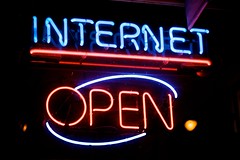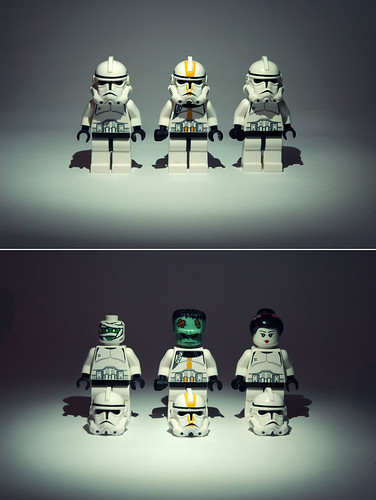
Right now, at the moment I write this post, Techmeme stands as
a monument to the end of the Steve Jobs era.
Go on, check it out... scroll down the Techmeme page... I've not honestly seen another day quite like this.
A zillion posts lionizing the man who, love him or hate him, has so disrupted multiple industries through his leadership of Apple. As Walt Mossberg wrote, Steve Jobs is very much still alive, but his resignation as CEO of Apple does indeed mark the end of an era. Tim Cook may have effectively been the CEO of Apple since January... and he may indeed be an excellent CEO to lead the company forward...
But he's not Steve Jobs.
No one truly can be.
I've been impressed by the many personal stories being written this morning. Among them:
I'm sure many more will be written today and in the days ahead. Including this post, of course.
The Original Hacker Machine
I can credit Steve Jobs for my start in computers. In 1977, my friend Dave's father bought one of the first Apple II computers. There we were... two 10-year-old boys playing with this amazing machine. People may not remember that the first Apple II was a true "hacker" machine. In a box somewhere, I still have the original Apple II manual, because it was truly a thing of beauty... you could find out everything about every single memory location and everything else you wanted to know about the computer. It was a wonderful way to learn.
In retrospect I suspect that that first manual was probably much more of the Steve Wozniak influence, as the next version of the computer, the Apple IIe, had the much simplified manuals that came to be part and parcel of "the Steve Jobs view" of the simplified user experience.
But that first Apple II set me on a path of learning about these things known as personal computers.
Teaching Teachers
Entering high school in 1981, the school had just received its first Apple II computer. I can remember it sitting there on a lone desk in a room that had all the other components of a DEC PDP-8 and other devices in it. The teacher responsible for the computer lab, Dan Ryan, let a group of us "play" with that one computer... and as the lab grew to include more Apple computers, our "computer club" learned more and more. They were amazing times.
In fact, my first job with computers was helping out two summers at the high school - as a high school student - helping teachers learn about these computers. I remember some who were very enthusiastic ... and one in particular who was so frightened of the machine (although I've long since forgotten that teacher's name.)
NOT Going To Antarctica
Apple also is responsible for a career choice that really led to where I am today. In the summer of 1990, I was working as field technician at a remote research station on top of the Greenland ice sheet. It was a six-week gig that I had literally stumbled into by walking into an office at UNH while unemployed and having a friend say "hey, the guys upstairs are looking for people to go to Greenland". And there I was.
While there, though, I had met this whole corp of people who spent their summers supporting field experiments in Greenland and our "winters" supporting field experiments in Antarctica (where it's summer). Competition to get into this group was fierce, but there was someone there who was willing to help me get connected... and as a single early-20-something, there was a great amount of appeal!
And then I received word that Apple had funded a grant proposal I'd submitted a few months back to start up a non-profit in New Hampshire that would help other nonprofit organizations learn how to use computer technology. Apple was donating several computers, printers and other devices to help me start this organization up.
So I put aside that Antarctic idea, returned to New Hampshire, started up the nonprofit... which ultimately led to other positions that brought me 20 years later to where I am today.
Fast Forward To Today
In fact, I write this post this morning on a MacBook Pro, the corporate laptop Voxeo distributes to all its employees. While my household had a mixture of Windows, Linux and Macs, it's evolved to where it's all just Macs... and a Linux server. My iPad2 is right next to me with my list of things I planned to do today. My iPhone is in its holster on my belt... having just moved from my armband where an app helped track my 4.5 mile run this morning.
Yes, I've helped fund Steve Jobs success. :-)
Systems That "Just Work"
But there's a reason for that... and it goes back to that vaunted perfectionism of Steve Jobs. For the most part, Apple's devices "just work".
When I moved from a Dell laptop to a MacBook Pro back in 2007, I had a very simple demonstration I would do for my Windows friends:
I closed the laptop. I opened it back up. In moments, I started typing.
I closed the laptop again. I opened it back up - and started typing.
I repeated this several times.
Certainly at the time this was not something that worked well on most Windows-based laptops. (May still not work well... don't know.) It was a little thing, but a HUGE timesaver!
Sure, there are reasons for things that "just work"... a closed system with proprietary hardware that is more expensive than other options. A fanatical obsession with CONTROL over every aspect of the system.
But in the end... it just works. Not all the time... and not every device... but for the most part.
One of Steve Jobs' greatest gifts to the industry was showing that:
user experience matters!
And the industry as a whole has seen the demonstration by Apple of what can be accomplished when you focus on the user experience.
Thank you, Steve!
I could go on... about how the iPod and the rise of podcasting has enriched my life... I could talk of the excellence of Jobs as a presenter (I loved Om's reference to him as a thespian)...
... but I will close by simply saying:
Thank you, Steve.
You've led Apple through an era of disrupting several industries... helped many of us in so many ways with your products... and taught us so much.
Thank you... and best wishes for what is next.
If you found this post interesting or useful, please consider either:


